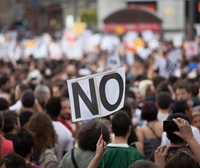Civil unrest isn't a common crisis that businesses need to deal with, but in light of recent events in Ferguson, Missouri, it should be a situation that firms are aware of.
A riot, the extreme transformation civil unrest into violence, is the most obvious threat to business operations and safety. If a riot breaks out, companies could be broken into, looted and have extensive property damage. Furthermore, if the event occurs during business hours, employees could be injured. This is why preparing for the worst case scenario is important.
The first step in implementing a business continuity plan for civil unrest is to properly assess how you will respond to crowds that have gathered in the area. Not all events can turn into a violent riot, and peaceful protests can build a community and strengthen it, so it's important not to act hastily. Being able to read a crowd and gauge the likelihood of turmoil and violence will help a company put its plan into action before a threat occurs.
A business also has to have a firm understanding of community dynamics in these situations. Know your employees and neighbors and be able to assess their reactions to a situation as well. This will help a company utilize its assets during a riot more effectively and protect its operations as needed. This may require extensive business impact analysis and strategizing, however, as human nature is far more difficult to predict than how technology will react during a disaster.
By understanding how to best prepare your business for civil unrest and implementing a strategy a firm can be ready for a riot or a non-violent protest and respond in an effective, yet also peaceful and cautious way.

